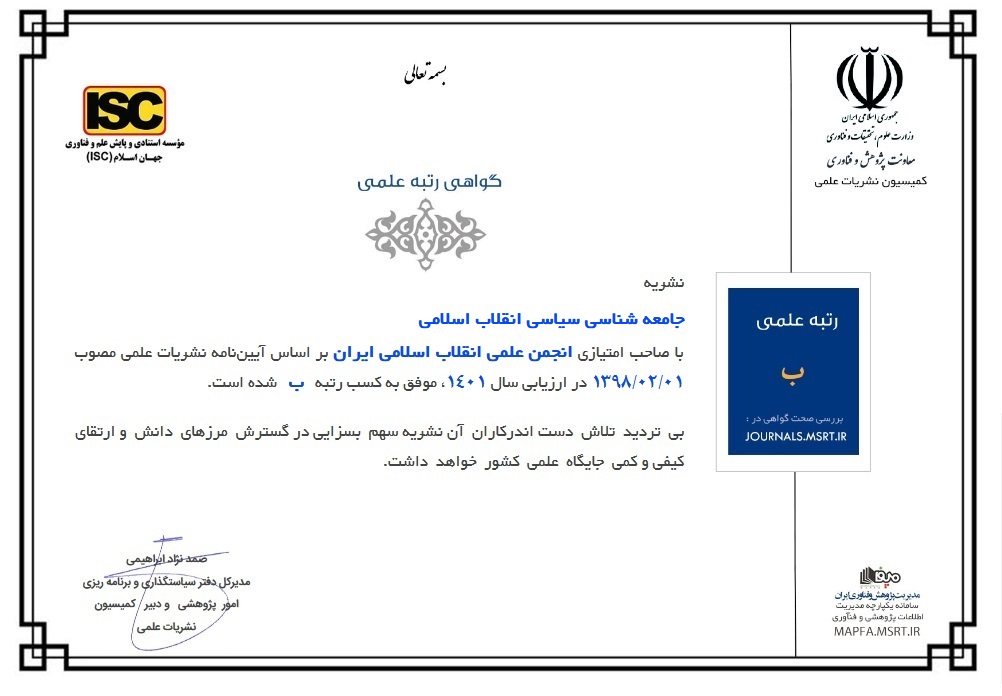نوع مقاله : مقاله پژوهشی
نویسندگان
1 دانشجوی دکتری، گروه ارتباطات، واحد تبریز، دانشگاه آزاد اسلامی، تبریز، ایران
2 استادیار، گروه ارتباطات، دانشکده علوم اجتماعی، ارتباطات و رسانه (FSSCM)، واحد تهران مرکزی، دانشگاه آزاد اسلامی، تهران، ایران
3 استادیار، گروه گروه روانشناسی، واحد ارومیه، دانشگاه آزاد اسلامی، ارومیه، ایران
4 استادیار، گروه ارتباطات، واحد تبریز، دانشگاه آزاد اسلامی، تبریز، ایران
چکیده
هدف این مطالعه، تبیین جامعه شناسی برندسازی سیاسی در احزاب ایرانی بعد از انقلاب اسلامی با تاکید بر رویکرد فراترکیب بود. به این منظور با رویکرد پژوهش کیفی و ابزار فراترکیب که شامل گامهای هفت گانهای است، به ارزیابی و تحلیل نظاممند نتایج و یافتههای پژوهش پیشین پرداخته شده است. در این روش با جستجوی کلیدواژه جامعه شناسی برندسازی سیاسی در احزاب ایرانی در پایگاههای اطلاعاتی گوناگون، در ابتدا 2151 مطالعه در بازه زمانی سالهای ۲۰12 تا ۲۰21 میلادی و ۱۳91 تا ۱400 خورشیدی یافت شد. از این تعداد، 1468 اثر از نظر عنوان، 429 اثر از نظر چکیده و 199 اثر از نظر متن با هدف و سوالات تحقیق حاضر همخوانی نداشتند؛ بنابراین این اثار کنار گذاشته شدند و تنها 55 اثر که در زمینه برندسازی سیاسی در احزاب ایرانی بعد از انقلاب اسلامی بودند و هم از نظر عنوان و هم از نظر محتوا با هدف و سوالات پژوهش حاضر همراستا بودند، برای تحلیل به روش فراترکیب و ارائه الگوی برندسازی سیاسی در احزاب ایرانی انتخاب شدند. با مطالعه و بررسی دقیق منابع نهایی شده، از هر کدام از منابع، مولفهها و شاخصهای جامعه شناسی برندسازی سیاسی در احزاب ایرانی بعد از انقلاب اسلامی استخراج شد. در مجموع الگوی برندسازی سیاسی در احزاب ایرانی بعد از انقلاب اسلامی در 6 مولفه و 55 شاخص شناسایی و طبقه بندی شد.
کلیدواژهها
عنوان مقاله [English]
Explaining the Sociology of Political Branding in Iranian Parties after the Islamic Revolution with an Emphasis on the Meta-Synthesis Approach
نویسندگان [English]
- Mohammad Esmaeil Haghparast 1
- Hourieh Dehghan Shad 2
- Hossein Honarvar 3
- Mehran Samadi 4
1 Ph.D. Student, Department of Communication, Tabriz Branch, Islamic Azad University, Tabriz, Iran
2 Assistant Professor, Department of Communication, Faculty of Social Science, Communication & Media (FSSCM), Central Tehran Branch, Islamic Azad University, Tehran
3 Assistant Professor, Department of Psychology, Urmia Branch, Islamic Azad University, Urmia, Iran
4 Assistant Professor, Department of Communication, Tabriz Branch, Islamic Azad University, Tabriz, Iran
چکیده [English]
This study aimed to explain the sociology of political branding in Iranian parties after the Islamic Revolution with an emphasis on the meta-synthesis approach. For this purpose, using the qualitative research approach and meta-synthesis tools, which includes seven steps, a systematic evaluation and analysis of the results and findings of the previous research has been done. In this method, by searching the keywords "Sociology of Political Branding in Iranian Parties" in various databases, initially 2151 studies were found in the time period of 2012 to 2021 (1391 to 1400 AH). Of these, 1468 studies in terms of title, 429 studies in terms of abstract and 199 studies in terms of content were not consistent with the purpose and questions of the present research; therefore, these studies were discarded and only 55 studies that were in the field of political branding in Iranian parties after the Islamic Revolution and were in line with the purpose and questions of the present research both in terms of title and content were selected for meta-synthesis analysis and presenting a model of political branding in Iranian parties. By studying and carefully examining the finalized sources, sociological components and indicators of political branding in Iranian parties after the Islamic Revolution were extracted from each of the sources. In total, the pattern of political branding in Iranian parties after the Islamic revolution was identified and classified into 6 components and 55 indicators.
کلیدواژهها [English]
- Brand
- Sociology
- Political Branding
- Iranian Parties
- Islamic Revolution

